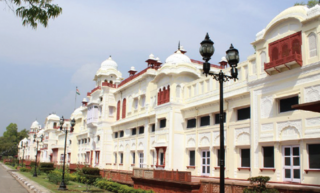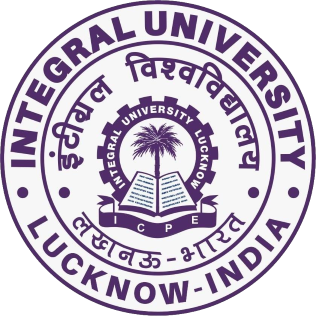
Nankana Sahib is a city and capital of Nankana Sahib District in the Punjab province of Pakistan. It is named after the first Guru of the Sikhs, Guru Nanak, who was born in the city and first began preaching here. Nankana Sahib is the most important religious site for the Sikh religion. It is located about 91 km (57 mi) west of Lahore and about 75 km (47 mi) east of Faisalabad. According to the census of 2017 the city has a population of 110,135 inhabitants. Until 2005, it was a part of the Sheikhupura District.

Patiala is a city in southeastern Punjab, northwestern India. It is the fourth largest city in the state and is the administrative capital of Patiala district. Patiala is located around the Qila Mubarak constructed by the Sidhu Jat Sikh chieftain Ala Singh, who founded the royal dynasty of Patiala State in 1763, and after whom the city is named.
A gurdwara or gurudwara is a place of assembly and worship for Sikhs. Sikhs also refer to gurdwaras as Gurdwara Sahib. People from all faiths are welcomed in gurdwaras. Each gurdwara has a Darbar Sahib where the Guru Granth Sahib is placed on a takhat in a prominent central position. Any congregant may recite, sing, and explain the verses from the Guru Granth Sahib, in the presence of the rest of the congregation.
The following outline is provides an overview of Sikhism, or Sikhi.

Panjab University (PU) is an Indian collegiate public state university located in Chandigarh. Funded through both State and Union governments, it is considered a state university. It traces its origins to the University of the Punjab in Lahore, which was founded in 1882. After the partition of India, the university was established on 1 October 1947, and called East Punjab University. Initially housed primarily at a cantonment in Solan, it later relocated to a newly built campus in Chandigarh, and was renamed Panjab University. It is accredited by NAAC at five star level, with the highest NAAC A++ accreditation grade.

The Shiromani Gurdwara Parbandhak Committee is an organization in India responsible for the management of Gurdwaras, Sikh places of worship in states of Punjab and Himachal Pradesh and the union territory of Chandigarh. SGPC also administers Darbar Sahib in Amritsar.

Punjabi University is a collegiate state public university located in Patiala, Punjab, India. It was established on 30 April 1962 and is only the second university in the world to be named after a language, after Hebrew University of Israel. Originally it was conceived as a unitary multi-faculty teaching and research university, primarily meant for the development and enrichment of the Punjabi language and culture, but alive to the social and education requirements of the state.

Budhlada is a municipal council located in the Mansa district of the state of Punjab, India. The area's main industry is agriculture, which provides the majority of employment opportunities in the region. The municipal council of Budhlada is divided into 19 wards, and regular elections are held every five years. It has held the status of a Class II Municipal Council since the 1950s.

Kartarpur is a town located, in the Shakargarh Tehsil, Narowal District in Punjab, Pakistan. Located on the right bank of the Ravi River, it is said to have been founded by the first guru of Sikhism, Guru Nanak, where he established the first Sikh commune.

Sikh architecture is a style of architecture that was developed under the Sikh Confederacy and Sikh Empire during the 18th and 19th centuries in the Punjab region. Due to its progressive style, it is constantly evolving into many newly developing branches with new contemporary styles. Although Sikh architecture was initially developed within Sikhism its style has been used in many non-religious buildings due to its beauty. 300 years ago, Sikh architecture was distinguished for its many curves and straight lines; Keshgarh Sahib and the Harmandir Sahib are prime examples.

The Delhi Sikh Gurdwara Management Committee (DSGMC) is organization in India responsible for the management of Gurdwaras, Sikh places of worship in Delhi. It also manages various educational institutions, hospitals, old age homes, libraries and other charitable institutions in Delhi. It is headquartered in Gurdwara Rakab Ganj Sahib, near Parliament House. Currently, the president of DSGMC is Harmeet Singh Kalka.

Integral University is a private university in Lucknow, the capital of Uttar Pradesh, India, It is located in the North-eastern part of the city in Dashauli, approximately 17Km from the center of the City. Integral University, the first enacted Minority University in the country, started functioning from 1 April 2004. U.G.C. accorded Integral University recognition under section 2(f) of the U.G.C. Act, 1956. The university was founded in 2004.

Guru Nanak Dev Engineering College is one of the oldest engineering institutions of the northern region situated at Gill Park, Ludhiana, Punjab, India. The foundation stone of the college was laid on 8 April 1956 by Hon'ble Dr. Rajendra Prasad, the first President of India. The college has been named after 1st Sikh Guru Guru Nanak Dev Ji.

Punjab has a long history of education.

Sri Guru Granth Sahib World University is a private university in Fatehgarh Sahib, Punjab, India. It was established under Punjab State Act 20/2008 and is recognized by UGC under section 2(f) of the UGC Act, 1956. Sardar Prakash Singh Badal announced the setting up of Sri Guru Granth Sahib World University at Fatehgarh Sahib, the holy place of martyrs, on the occasion of the fourth centenary celebrations of the compilation and the first installation of Sri Adi (Guru) Granth Sahib in 2004.

Hazur Sahib, also known as Takht Sachkhand Sri Hazur Abchalnagar Sahib, is one of the five takhts in Sikhism. The gurdwara was built between 1832 and 1837 by Maharaja Ranjit Singh (1780–1839). It is located on the banks of the Godavari River at the city of Nanded in the state of Maharashtra, India.

D.A.V. College is a private aided college based in Jalandhar, Punjab, India. It was founded in 1918 by Pt. Mehar Chand. The college admits both undergraduates and post-graduates and career-oriented programs under the purview of Guru Nanak Dev University, Amritsar.
Punjabi University Guru Kashi Campus (PUGKC) is a regional centre of Punjabi University, located at Talwandi Sabo, India. Its main constituents are Yadavindra College of Engineering, University School of Business Studies and Punjabi University Guru Kashi College.















